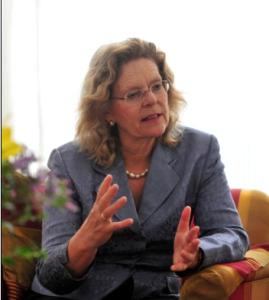 |
| Austria's ambassador to both Mongolia and the People's Republic of China Irene Giner-Reichl. [Women of China English Monthly] |
Irene Giner-Reichl has been a member of Austria's diplomatic corps since 1982. Her main areas of expertise are economic and social development, women's rights, the environment, energy, and development cooperation. She has held numerous international posts over the years; for example, from 1995-1998, she served as director of the international department of Austria's Ministry for the Environment. From 1998-2001, she was Austria's Permanent Representative to the UN, IAEA, UNIDO and CTBTO in Vienna. From 2001-2004, she was posted, as assistant director-general, to the UNIDO Office in New York. From 2005 to January, 2012, she was director-general in the Ministry for European and International Affairs. In January 2012, she assumed the position as Austria's ambassador to both Mongolia and the People's Republic of China.
Irene Giner-Reichl founded the Global Forum on Sustainable Energy (GFSE) in 1999 to be a multi-stakeholder platform for dialogue on energy and sustainable development. In the first few years, she was convener of GFSE's global and regional meetings. She has training and extensive experience in yoga, and adult education. Her hobbies include horseback riding, trekking, reading and listening to music. Women of China English Monthly recently interviewed Giner-Reichl about her life in China. The following is that interview, in question-and-answer format:
Women of China (WOC): Would you please tell our readers about your work and life experiences in China?
Giner-Reichl: I arrived in China in January 2012. I have a strong professional, multilateral background, especially in the areas of development cooperation and the environment. I see a lot of ground to foster cooperation between Austria and China in those areas.
Austrian technology and know-how are internationally renowned, especially in the growing fields of green tech, urban management, energy efficiency, integrated water management and biotechnology. Austria is already actively involved in the EU-China Strategic Partnership on Urbanization, and (Austria) has taken over the (lead) in the area of water and sanitation technologies within the EU-China Water Platform. I am convinced, by increasing our cooperation, Austria can make a valuable contribution to China's development. Austria would be honored to support China in achieving its environmental-protection and energy-conservation goals, while maintaining the robust and broad-based economic development, which is essential for building sustainable prosperity for all.
In terms of my private life, I really enjoy living in the area around Ritan Park. I go to the park in the morning, like Chinese people, and take part in the daily exercises. My husband and I have started playing jianzi (shuttlecock). We also go horse riding regularly outside of Beijing.
WOC: To date, what is your most impressive memory of China?
Giner-Reichl: Without a doubt, it was meeting President Hu Jintao to present my credentials to him. We talked about his State visit to Austria in November 2011. He told me that he was particularly impressed by his visit to a farm in Salzburg, where three generations of a family lived under one roof (and ran) a modern agricultural business. My visits to the different provinces have also provided many memorable experiences. Everywhere I go, I see optimism and confidence in China's future development.
WOC: In recent years, an increasing number of international students have chosen to study in China. Why do you think that has been the situation? What advice would you give Austrians who plan to study in China?
Giner-Reichl: With the reform and opening-up policy over the past 30 years, China has become more important as a player on the world stage, and that has attracted an increasing number of students. Many Austrians are fascinated by China, and they want to learn more about its history and culture. The geographical distance is undoubtedly an obstacle between our countries, but as an increasing number of Austrians learn Putonghua and visit China, we will see this distance diminish, at least in our minds.
Austria can benefit a lot from Chinese knowledge and wisdom. Health is one example; Vienna's Medical University is running one of the first overseas TCM (traditional Chinese medicine) postgraduate programs directly accredited by Chinese authorities. I think it is very important to foster exchanges between the two countries, not only in the political and economic spheres, but also between our peoples.
WOC: You studied Chinese before you arrived in Beijing. Would you tell our readers how that has affected your work and daily life in China?
Giner-Reichl: I started to learn Chinese as soon as I knew I was to become ambassador to China. It is very important that I be able to communicate with local people in their own language. It also gives me a clearer picture of the issues that are of importance to Chinese, and it helps me to better understand the country.
(Source: Women of China English Monthly 2013 June Issue )

 京公网安备 11010102004314号
京公网安备 11010102004314号